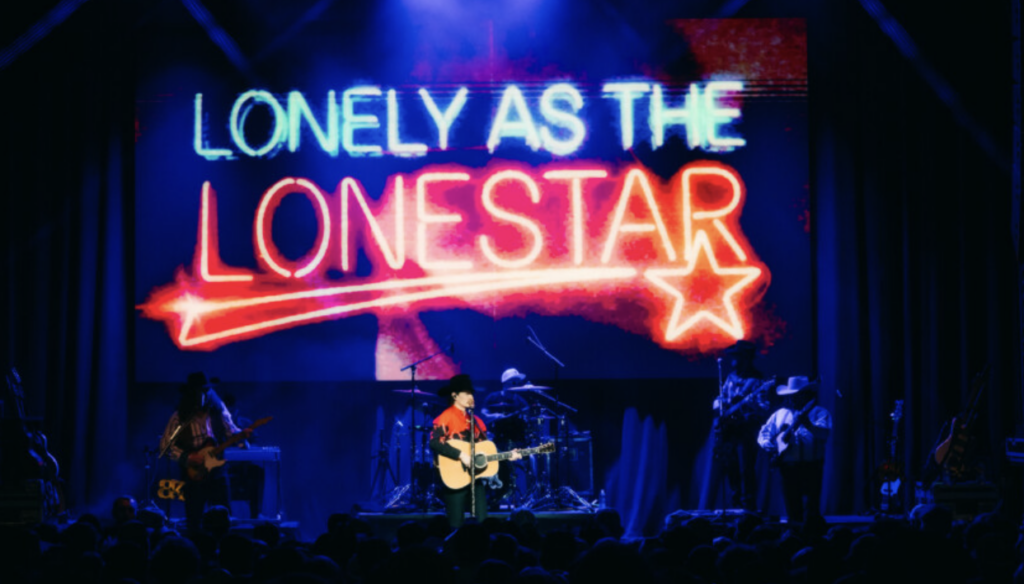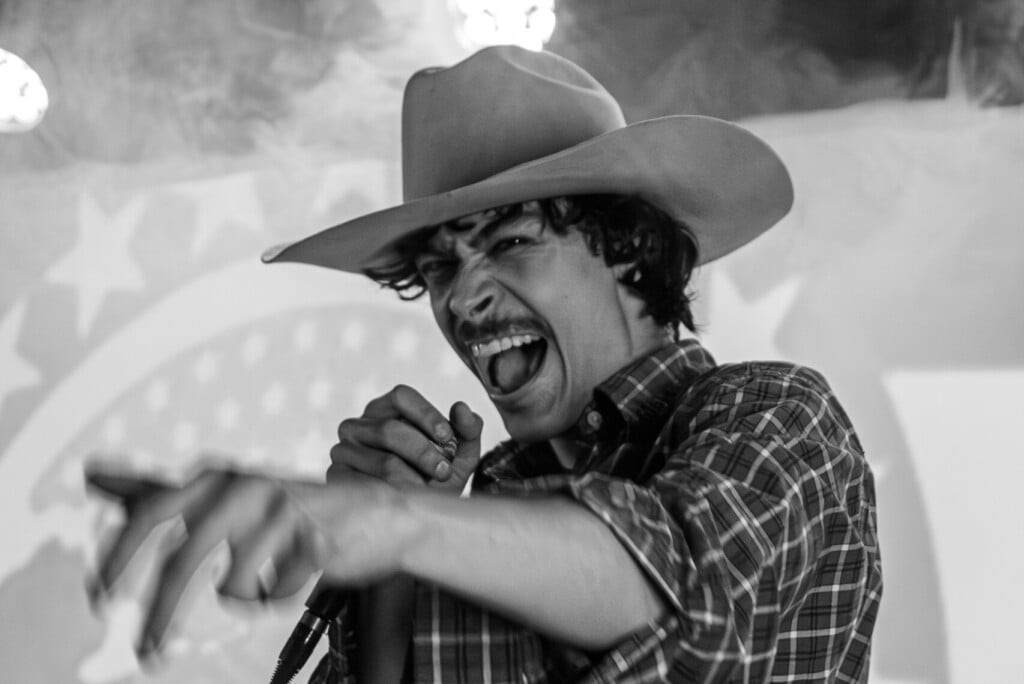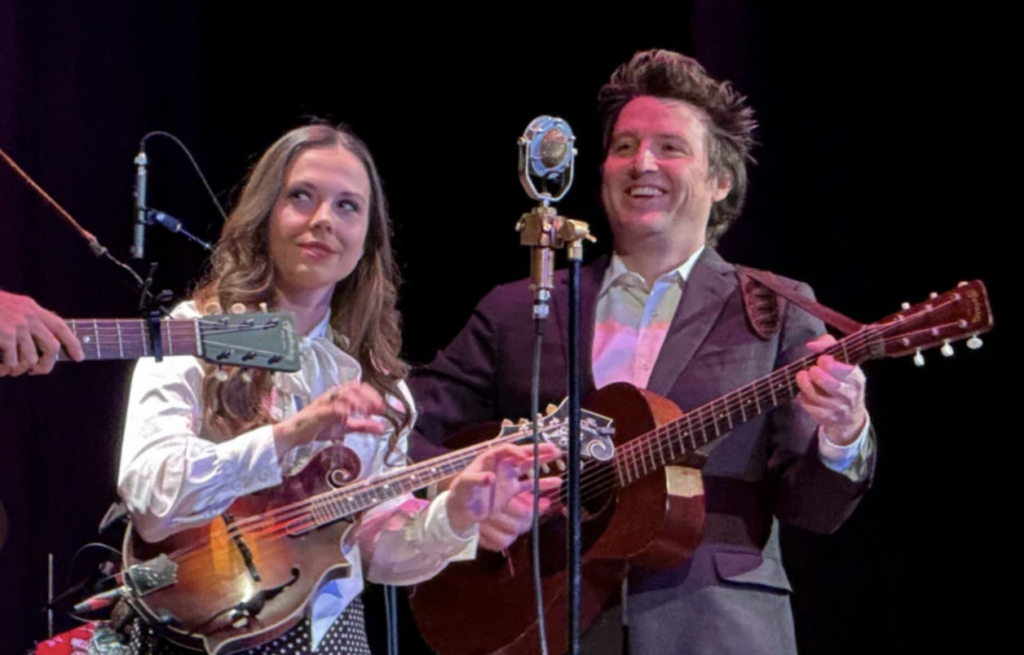Blues musician Brody Buster returns with Redemption arc
This past Sunday, April 20, longtime area blues musician Brody Buster released Redemption, his first album since 2019’s Brody Buster’s One Man Band album, Damn! I Spilled the Blues.
It comes on the heels of quite a few life changes for the former child harmonica prodigy, which included leaving Lawrence for Kansas City and getting clean from drugs. It’s been a bunch of big changes for Buster, all of which are reflected in Redemption‘s nine powerful songs.
We hopped on the phone with Brody Buster to discuss the new record and his life these days.
 The Pitch: The album cover seems like it tells a story.
The Pitch: The album cover seems like it tells a story.
Brody Buster: It does. It tells a story of coming out of addiction.
The artwork is just immediately arresting and it doesn’t look like a blues album cover. Is that what you were trying for?
I kind of just came up that, with that idea on spur of the moment, the back of the album cover was kind of the original idea. I wanted to be tying my shoe in the picture to symbolize that I’m starting over. Then I just had this idea, and I started looking at clip art, and I just pulled all this clip art up and put it in that grid form and tried to tell my story through clip art.
I think it really ties into the story of the album, in that it’s a new way of doing things.
Yeah. I didn’t want it to look like a typical blues record either, because I was trying to be creative with, with not only the music, but the art on the album, as well.
The music on Redemption feels very much like you have a newfound lease on life, not just lyrically, but the energy seems like it is just coming through the speakers. When did you start work on the album?
We started work on the album about a month and a half before we recorded it. I went to Jacque Garoutte with Levee Town ’cause he had been playing bass with me on some stuff. I asked him to produce the record because I knew that he’s an older cat and he’s done it before. We have Ian Pond on the drums. Me, Ian and Jacque rehearsed the songs for like a month and a half every Wednesday at Jacque’s house and then, about two weeks before it, we added Jackie Myers on the organ to the rehearsals, and then we just went in there and banged it out.
On “Working for the Devil,” we had Howard Mahan come in and do slide guitar work on that one, and then Daniel Nicole came in and did backup vocals on one song. We were all real tight when we went in there. We did all the bass tracks, all the rhythm tracks and all the foundation of the music in one day and then, the next day I went in and did the vocals and replayed some of the solos and Jackie replayed some of the solos, then we mixed it.
What did moving to Kansas City offer you, in terms of getting this album made?
Well, I was living in Lawrence and I had to leave Lawrence to get off drugs. It was just everywhere I was–it was the people I was running with. I moved in with a long-time friend of mine, who turned into my significant other, Tanya. She offered me a place to come and get clean. I came here and I got clean and then I started hitting the jams. The first jam I hit was Coyote Bill’s jam, and I just started hitting the jams, and then I started booking my one-man band around Kansas City again.
By going to the jams, I got the other musicians in town basically to vouch for me at all the places that I had burned bridges with. I slowly worked my way back into the scene as the one-man band, and then I started doing shows as a trio, and then now I’m doing shows as a full-blown five-piece band.
https://www.youtube.com/watch?v=w74iykqukkA
What does the one-man band offer that a full band or trio doesn’t and vice versa?
Well, that’s why I’m able to work so much is that I’m very versatile. I gig all the time and on those Monday nights, those Tuesday nights, places ain’t got a budget to have a whole band and so I go in there and I do the one-man band, and when I add my tips to it, I can walk out of there with $400 on a Monday night. That prevents me from having to work a regular job.
There’s a whole different set of rooms I can play as a one man band. You know, there’s lots of places to play that don’t even have bands. They just have solo or duo acts. So the one-man band–I like doing it, but it’s my breadwinner during the week, you know?
Does it require a lot more concentration when you are doing everything as opposed to being part of the band?
Well, I play the songs way differently. There are songs I play one-man band that I do in the band, too. There’s maybe like 15-20 songs that cross over between both things, but I play a lot of one-man band stuff that the band doesn’t do and I play a lot of band stuff that the one-man doesn’t do, but there’s maybe 15 songs that I do in both. When I do one-man band versions of ’em, I do ’em completely differently based on what I can do as one person.
Was there trepidation about taking these songs that are about a very hard time in your life and recording them so soon?
I wanted to get it done fast, you know, and I got the ball rolling and, yeah–I mean, I’m not even two years sober yet. I did all this in under a year and a half. This was really my first real time in an actual studio, building a record and so it was a learning experience. It came out really good and I’m really happy with the way it went.
As far as the emotion in the songs, I’m not shy to tell my story. Everybody already knows. Everybody around Kansas City already knew that I was bad on drugs. That song, “Can You Hear Me?”, is basically a way to say, “Yo, I’m off drugs and I’m ready to work and ready to be doing what I’m supposed to be doing,” which is playing music.
“Can You Hear Me?” could be titled “I’m Back.” It’s the same thing. It’s the same message.
Brody Buster’s Redemption is out now and you can find all of his upcoming live shows on Facebook.





